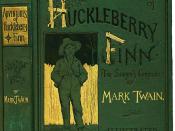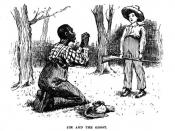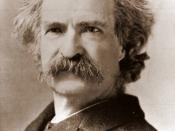The Critic
Mark Twain's novel, "The Adventures of Huckleberry Finn," pokes fun at society on all different levels. From dialect and word usage to religion and people's actions, many aspects of society are satirized. This criticism makes the drama in the book light instead of heavy. Twain, a severe critic of the general public and its cruel, inane conventions, ridicules the following three aspects of society; religion, the lower class, as well as the lower class; in "Huck Finn."
Mark Twain criticizes religion and the way that people practice their own. When the Grangerford's and the Shepherdson's go to church and listen to the sermon about brotherly love, they hold their guns at their sides at all times. After the sermon, everyone talks about what the preacher said and how good his words were. (Twain, p.106) Twain ridicules this because the families spoke of faith and brotherly love and they were carrying on a thirty-year quarrel and carrying their guns to church.
Huck's caretaker, Miss Watson, speaks of God and the Bible and how she is going to civilize and Christianize Huck and yet she owns a slave. What is this teaching Huck? Love for all mankindâ¦probably not. (Twain, pp.12-13)
Twain's criticism reflects on social classes, too. The ignorance and sheer stupidity is brought out in the lower class. Pap says, "The law backs that old Judge Thatcher up and helps him to keep me out o' my propertyâ¦They call that govment! A man can't get his rights in a govment like this. Sometimes I've a mighty notion to just leave the country for good and all." (Twain, p.27) Pap is ignorant of the law system and, apparently, the governments of other countries. Pap also shows his ignorance and stupidity when he says, "It was 'lection day, and...


